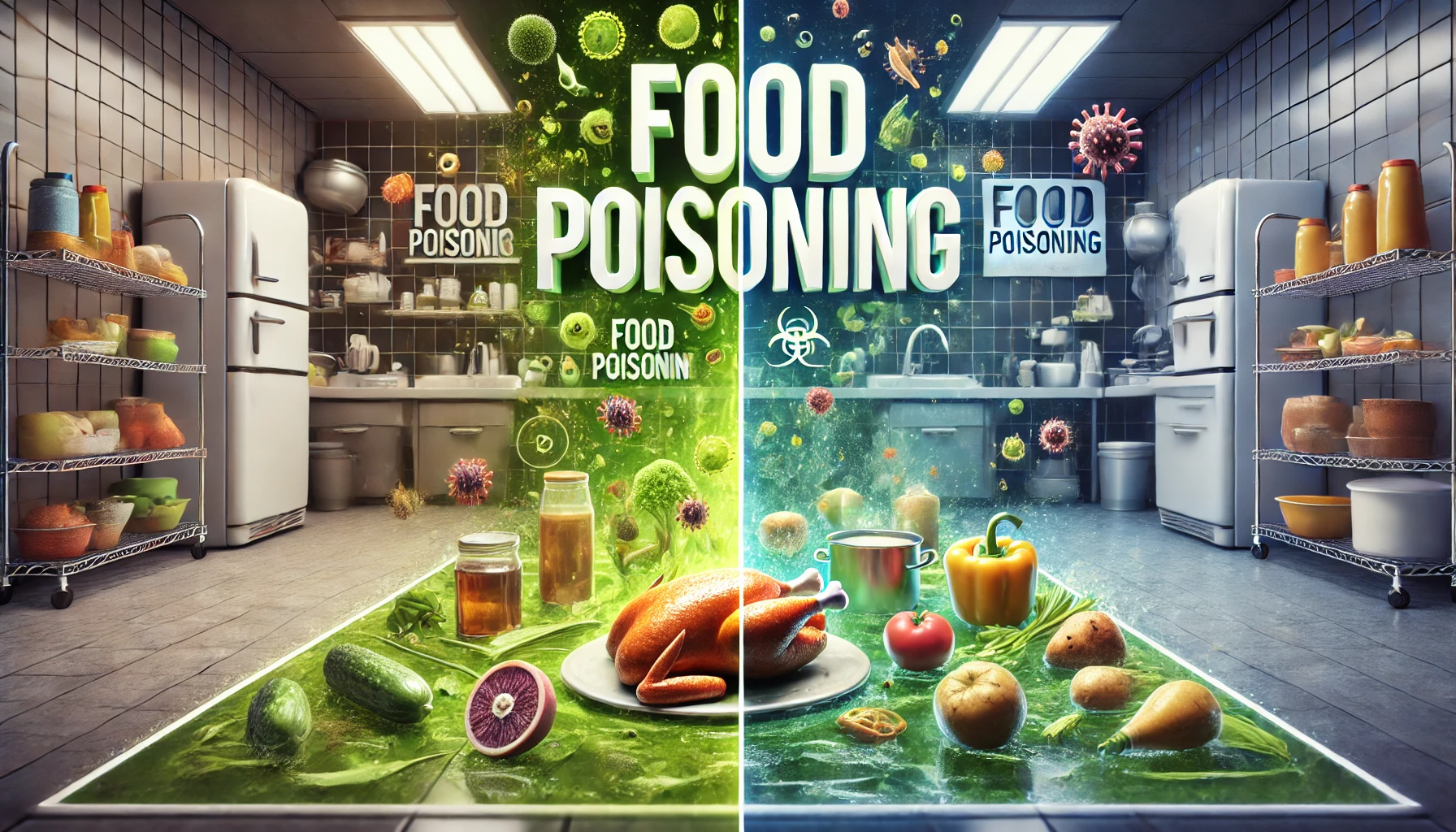
Food Poisoning in Ghana's Rural & Urban Centres: How Not To Be a Victim 🍗🤮💩
Below is a clear and simple health article on food poisoning specifically tailored for Ghanaians. It is divided into parts for easy reading. We will address causes, signs/symptoms, myths, treatment options, complications, and more—so you can learn how to protect yourself and your loved ones.
PART 1: OVERVIEW OF FOOD POISONING
What is Food Poisoning?
Food poisoning (also called a foodborne illness) happens when you eat or drink contaminated foods or liquids. Contamination can happen anywhere—at home, in restaurants, on the street, during cooking, or even at your favorite local ‘chop bar.’ Common Ghanaian foods such as waakye, jollof, banku, or fried rice may become contaminated if not handled safely.
Quick Facts
- Is food poisoning dangerous? Yes, it can be. Severe cases can lead to serious health problems and even death if not treated promptly.
- Are food poisoning and salmonella the same? No. Salmonella is just one type of germ (bacteria) that causes food poisoning. There are many other types, too.
- Are food poisoning and stomach flu the same? Not exactly. Stomach flu is usually caused by viruses like norovirus, while food poisoning can be caused by bacteria, viruses, or toxins. However, the symptoms can be very similar.
Images are only illustrative; may not pass an academic critique
PART 2: CAUSES OF FOOD POISONING
Food poisoning happens when harmful germs (bacteria, viruses, or parasites) get into your food or drink. In Ghana, some common causes include:
Poor Food Hygiene
- Using unclean water to cook or wash utensils.
- Storing raw meat, fish, or poultry together with vegetables.
- Leaving cooked food uncovered or unrefrigerated for too long.
Undercooked Meats
- Chicken, beef, pork, or fish that is not properly cooked can contain harmful bacteria (like salmonella or E. coli).
Street Foods & Improper Handling
- While street foods like kelewele or tsofi can be delicious, the risk of contamination is higher if vendors do not follow good hygiene practices.
Contaminated Water
- Drinking water that is not boiled or filtered, especially in areas with unsafe water sources.
Toxins & Chemicals
- Certain natural toxins (e.g., from spoilt fish or green potatoes) or chemical contaminants can also cause food poisoning.
How Food Poisoning Occurs
- Germs (bacteria, viruses, parasites) or toxins contaminate the food or water.
- You eat the food or drink the water.
- The germs or toxins enter your body, leading to illness.
Images are only illustrative; may not pass an academic critique
PART 3: SIGNS AND SYMPTOMS
When do food poisoning symptoms start?
Symptoms often start anywhere from a few hours to a few days after eating the contaminated food. In some cases, it might take a week or more. This timing can vary depending on the type of germ or toxin involved.
Common Symptoms
- Nausea and Vomiting
- You may feel like throwing up or actually vomit.
- Diarrhea
- This can be watery or sometimes bloody; diarrhea lasting more than 24 hours needs attention.
- Stomach Pain and Cramps
- Abdominal discomfort that can range from mild to severe.
- Fever and Chills
- Not all types of food poisoning cause fever, but many do.
- Headache and Body Aches
- You can feel weak, fatigued, or get headaches.
Are Food Poisoning Symptoms Contagious?
- Most bacterial food poisonings (like salmonella) are usually not contagious from person to person, though germs can spread if an infected person does not wash their hands properly.
- Viral causes (like norovirus) are more easily spread from person to person.
Do They Always Show Immediately?
- Not always. Some germs cause symptoms within 1-6 hours, while others can take 1-2 days or longer.
Can Symptoms Mimic Other Conditions?
- Yes. Food poisoning symptoms can sometimes feel like malaria, flu, or even pregnancy-related nausea. If unsure, consult a health professional.
PART 4: MYTHS & MISCONCEPTIONS
Ghanaians often have cultural beliefs or myths around food poisoning. Here are some common ones:
- “It’s a Spiritual Attack”
- Some people might believe that stomach pain or vomiting is caused by a curse or “juju.” While spiritual beliefs are deeply personal, food poisoning is usually due to germs and not curses.
- “Traditional Concoctions Will Cure It Immediately”
- Some herbal remedies can help with mild stomach upset or diarrhea. However, many so-called “miracle” cures have no scientific proof. If symptoms are severe, traditional remedies alone might not be enough and could delay proper treatment.
- “Once Vomiting Stops, You’re Fine”
- You can still have infection or dehydration issues even if vomiting stops. Always monitor your overall health and rehydrate properly.
Images are only illustrative; may not pass an academic critique
PART 5: TREATMENT OPTIONS
1. Home Care (Mild Cases)
- Rehydration: Drink plenty of clean water, coconut water, or oral rehydration solutions (ORS) to replace lost fluids.
- Rest: Get enough rest to help your body fight off the illness.
- Easy-to-Digest Foods: Eat light foods such as rice, toast, or porridge (koko) if you can tolerate them. Avoid spicy or oily foods until you feel better.
2. Medical Treatment
Seek professional medical help if you experience:
- High fever that does not go away.
- Bloody diarrhea or diarrhea lasting more than 24 hours.
- Severe dehydration (dry mouth, dark urine, feeling dizzy).
- Severe stomach pain or persistent vomiting.
A doctor might:
- Give you oral or IV fluids for dehydration.
- Prescribe antibiotics if the cause is bacterial.
- Provide anti-diarrheal medications in specific cases (although sometimes these are avoided if the infection is severe, as your body needs to expel the germs).
3. Avoiding Unproven Claims
- Be cautious of traditional healers who promise a quick fix with untested herbs.
- Always consult a qualified health professional if symptoms persist or worsen.
Images are only illustrative; may not pass an academic critique
PART 6: COMPLICATIONS
If left untreated, food poisoning can lead to:
- Severe Dehydration
- Losing too much fluid can harm your kidney function and other organs.
- Organ Damage
- Certain bacteria (like E. coli) can cause serious complications like kidney failure if not handled quickly.
- Miscarriage or Pregnancy Complications
- Pregnant women must be extra careful; certain food poisoning germs (like listeria) can cause miscarriage or affect the unborn baby.
- Sepsis (Blood Infection)
- In rare cases, the infection can spread to the bloodstream, causing life-threatening complications.
- Death
- Although less common, it can happen with dangerous germs or in people with weak immune systems.
PART 7: PREVENTION TIPS
Prevention is always better than cure. Here’s how you can avoid food poisoning in Ghana:
- Wash Hands & Utensils
- Use clean water and soap. Proper handwashing before cooking and eating is crucial.
- Cook Thoroughly
- Especially meats, poultry, and fish. Make sure they are well-cooked, with no pink or rare parts.
- Separate Raw & Cooked Foods
- Raw meat should not touch ready-to-eat foods (like salad or fruits). Use different cutting boards and utensils.
- Proper Food Storage
- Refrigerate leftovers quickly. Avoid leaving cooked food at room temperature (especially in Ghana’s warm climate) for more than 2 hours.
- Use Clean Water
- Boil, filter, or treat water if you are unsure of its safety.
- Check Food Condition
- Avoid foods that smell strange, have mold, or have passed their expiry date.
PART 8: WHEN TO SEE A DOCTOR
- If you have persistent fever, vomiting, or diarrhea for more than 24 hours.
- If you see blood in your stool.
- If you feel extremely weak or dizzy, or show signs of dehydration (dry mouth, dark yellow urine, sunken eyes).
- If you are pregnant and notice any severe symptoms.
PART 9: KEY TAKEAWAYS
- Food poisoning is common but can be prevented with good hygiene and proper cooking.
- Symptoms vary but often include vomiting, diarrhea, stomach pains, headache, and fever.
- It is not always immediate; symptoms can show up from a few hours to days after eating contaminated food.
- Some forms can be contagious, especially if caused by viruses like norovirus.
- Seek medical help if symptoms are severe or do not improve.
- Don’t rely solely on myths and untested remedies; prompt treatment can save lives.
Images are only illustrative; may not pass an academic critique
Final Word
Food poisoning in Ghana can be managed and prevented through awareness, hygiene, and early treatment. Remember that while traditional knowledge is important in our culture, severe cases require professional medical advice. With safe food handling and a bit of caution, you can keep yourself and your family healthy.
If you suspect you have food poisoning and your condition worsens or doesn’t improve, see a healthcare professional. Early intervention can prevent complications and, in some cases, save your life.
Stay safe, eat clean, and stay healthy!
- When the Belly Roars: Ghanaian Strategies for Diarrhoea Management 🚽🧻
- From Kpakpo Shito to Clean H2O: How To Stay Cholera-Free 🤮🚽
- Popular Ghanaian Dishes: Ingredients, Nutrients, Health Benefits, and Myths 🥘🍲🍚
- Cleanse or Risk? Navigating Enema Risks and Rewards the Ghanaian Way 💧🌿🚽
- Building Immunity: Your Path To a Disease-Free Future 💪

We Love to Educate for Free
But please do not self-medicate as wrong doses of even correct medications can cause serious complications like kidney failure and even death. You can talk to a LICENSED health professional (including medical doctors, specialists, physician assistants, clinical psychologists, nutritionists/dieticians, medical herbalists, etc) by downloading the Deluxe Hospital app here:










